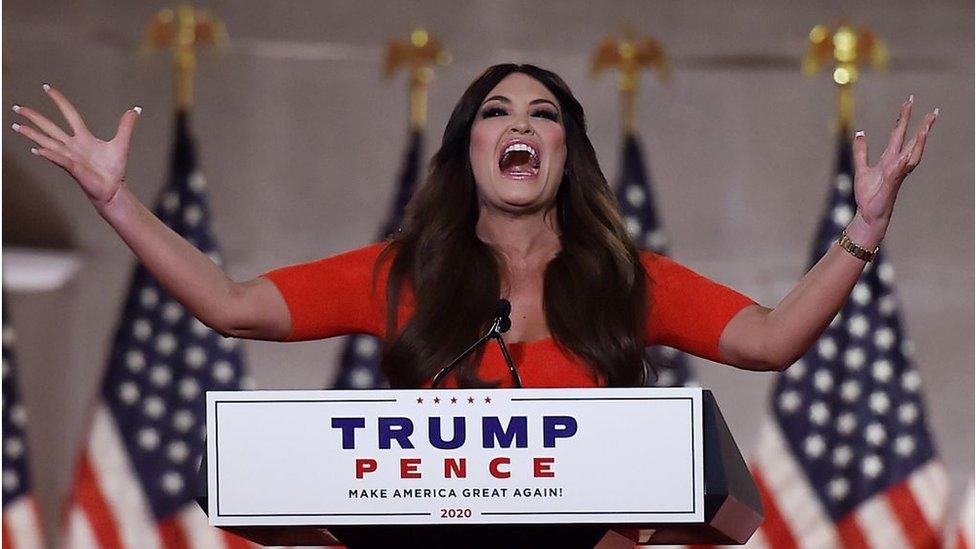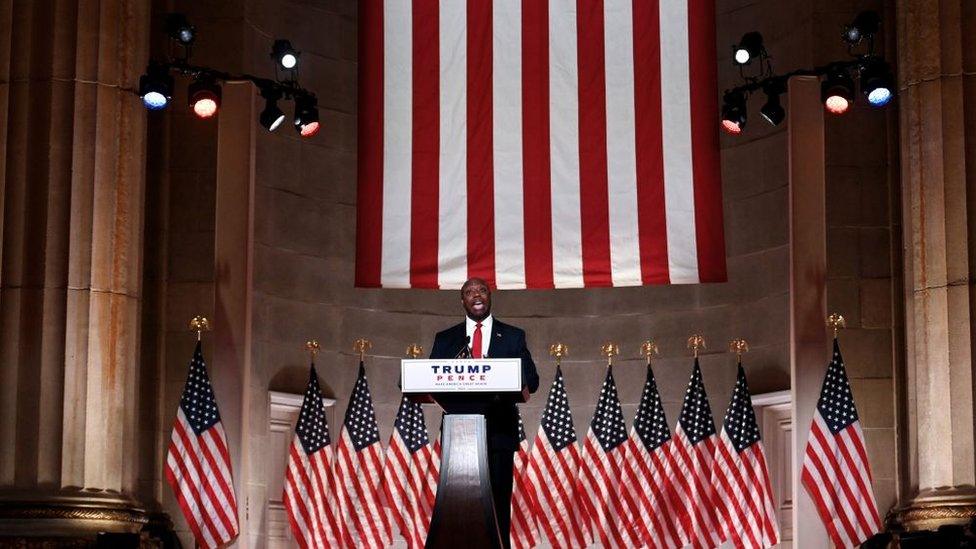RNC 2020: Rising stars of a post-Trump Republican party take stage
- Published

Kimberly Guilfoyle delivers a passionate convention speech
The first night of the Republican National Convention was a two-and-a-half hour rebuttal to the accusations Democrats levelled at Donald Trump during the four nights of their convention last week.
Did the president mishandle the coronavirus pandemic? The Republicans offered slick videos and first-hand accounts of the steps the president took to speed medical research, provide protective supplies and implement economic relief.
Is the president inflaming racial divisions in the US? Former football star Herschel Walker spoke of his 37-year friendship with Mr Trump. Tim Scott, the first black Republican senator since the late 19th Century, touted the president's work on sentencing reform and tax breaks for economically distressed communities.
Does the president lack empathy? Congressman Jim Jordan spoke of how Mr Trump offered sympathies when a relative died, and the president himself held a pre-taped White House forum where he offered words of support for coronavirus survivors and healthcare workers.
Polls suggest American voters have serious doubts about the president on all these issues - doubts that predated the Democratic convention attacks. Republicans have four days to assuage these concerns, chip away at Democratic opponent Joe Biden's lead and remind supporters what they like about Mr Trump's presidency.
It's an imposing task, but the Republicans have identified what work has to be done.
'Trump's actions speak louder than stickers or slogans'
Contrasting visions of a post-Trump party
But the success of the first night may hinge on what image viewers take away from it.
Was it Mr Scott talking about his grandfather and how his family "went from cotton to Congress in one lifetime"?

Tim Scott is the only black Republican senator
Or was it Republican activist Kimberly Guilfoyle shouting her speech, concluding with a call-out to "leaders and fighters of liberty and freedom"?
Clearly the two speeches were geared toward two different audiences - Ms Guilfoyle to rally the Trump faithful, and Mr Scott to reach out to suburban moderates concerned about the president's sometimes inflammatory language on racial issues. But they made for a jarring contrast.
Mr Scott's speech, which capped the last hour of Monday night's convention was also, perhaps, the conclusion of the first trial heat of the 2024 Republican presidential nomination fight.
There's been a lot of talk about how the Republican party could renounce Mr Trump if he were to lose in November, but the reality is the president has probably made a lasting mark on the party win or lose. The next nominee will probably be someone a lot more like the three final speakers of the evening - and they all acted like they were testing the political waters.
Mr Scott introduced himself to Republicans, taking the first half of his speech to talk about his life and upbringing.
Then there was his fellow South Carolinian, former UN Ambassador Nikki Haley, who could run as a bridge between Trumpism and the more traditional Republicans who predated his rise. It's certainly the tone she struck in her speech.
'My father's entire worldview is that we can always do even better'
But if Trump supporters in four years want more Trump, they might opt for the other featured speaker, Donald Trump Jr - who also happens to be Ms Guilfoyle's boyfriend. He offered a speech that was part populist red meat and part motivational sales pitch ("Imagine the life you want to have - one with a great job, a beautiful home, and a perfect family. You can have it!").
There are, of course, other Trumps scheduled to speak this week, with presidential daughter Ivanka getting a prime Thursday night slot before the president's address.
And, of course, Vice-President Mike Pence has been positioning himself for a presidential run of his own practically since Trump named him as his running mate. He'll get to make his case to be the Trump torch-bearer on Wednesday night.
It may just be under three months until the next presidential election, but it's less than three years until the next Republican presidential field takes shape.

